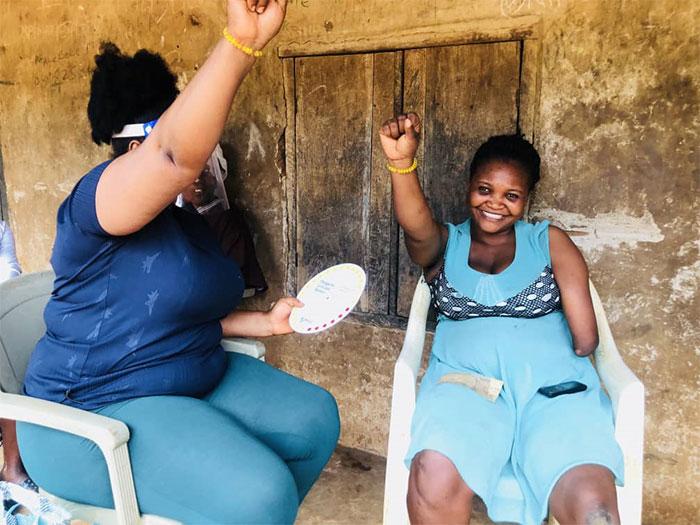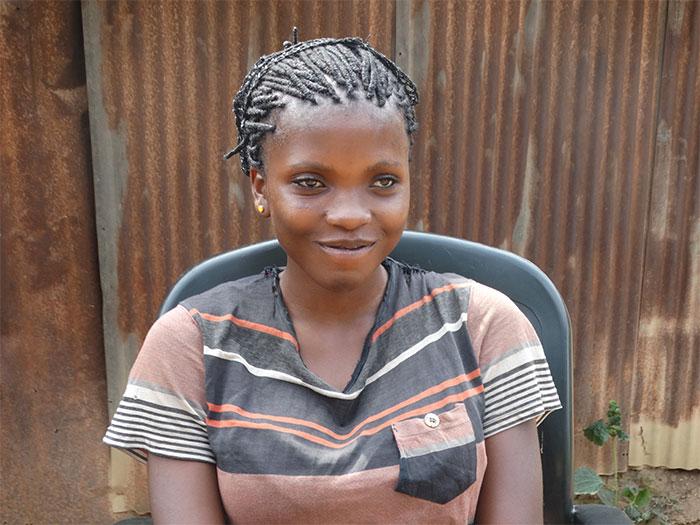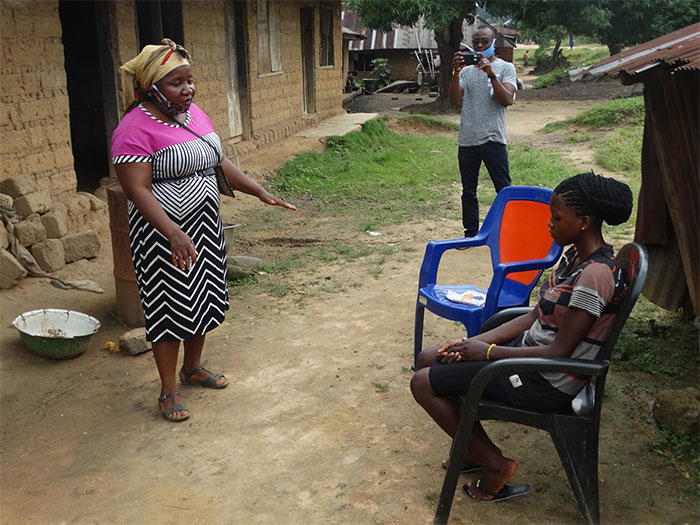By Jonathan Iwunze

More than one billion people worldwide are estimated to have a disability. Of this number, UNICEF observes, “Women and girls are more likely to have a disability, facing a 19 per cent likelihood rate versus 12 percent for men and boys. According to a 2017 report by the United Nations Secretary General on the situation of women and girls with disabilities and the status of the Convention on the Rights of Persons with Disabilities (CRPD), women and girls with disabilities were expected to reach 700 million globally by 2015.”
Around the globe, menstruation is a monthly occurrence for some 1.8 billion girls and women of reproductive age, according to UNICEF statistics. Scores of disabled women and girls in Nigeria’s impoverished suburbs and rural areas are undoubtedly a part of these numbers.
In many of these rural areas, taboos associated with menstruation, combined with an overall culture of silence around the topic, limit the ability of women and girls to fully and equally participate in society, undermining their overall social status and self-esteem.
Disability also carries stigma, so disabled people may face layers of discrimination when they are menstruating. A 2019 UNICEF systematic review of menstrual hygiene management requirements, its barriers, and strategies for persons with disabilities found that menstruation challenges were a source of shame for girls and women with disabilities, with consequences like social isolation.
However, with the right interventions targeted at changing the narrative of the menstruating disabled rural woman and girl-child, NGOs are promoting MHM education to enable disabled women to manage their menstruation hygienically and with dignity.
Mirabel Odey, 26, lives in Bebekanyak community in Sankwala town, in Obanliku LGA of Cross River State. For Mirabel, her childhood though filled with happy memories as she was born into a caring family, wasn’t like that of every other child.
Mirabel was born with a congenital limb defect, a condition where a child is born with malformed limb. In Mirabel’s case, she was born with a half left arm, and her left leg developed to the knees like an amputee.
“I had moments during childhood when I felt left out, since I could not engage in every single activity that characterizes the average life of a growing child,” Mirabel said. More so, there were moments when she felt lonely and sad as she couldn’t explain why she had to be different from the average child.
Mirabel was born into a community riddled with myths, tales, and taboos about menstruation. A world where menstruation was not openly discussed as ignorance held sway. And being a girl-child, came with many disadvantages especially about menstruation.
Menarche eventually came and “I was scared,” Mirabel recalls. “I hadn’t experienced anything like that before and didn’t know what it was.” Thankfully, she was able to get much support and mentoring from her older sisters who helped her through the process.

Asked if she normally needs help managing her periodic menstrual flow, she says with pride. “I handle it all by myself and don’t need any assistance.”
Mirabel may have received timely assistance through the menstrual process, but the challenge of breaking the silence remained a struggle.
Fortunately, the RUSHPIN Programme organized by United Purpose, facilitated Menstrual Health Hygiene (MHH) activities in communities in Obanliku LGA, Cross River, State. And her community benefited from the awareness campaign and training.
Recounting how she personally benefitted from the exercise, she acknowledged that her knowledge on menstruation had been greatly improved. For the very first time, she was introduced to reusable pads and the process of preserving same hygienically. She no longer had to spend money on costly commercial sanitary pads or use cloths that were hardly convenient during the menstrual process.
Part of her resolve was to spread the word henceforth to all and sundry, including her brothers and the men in the community. Educating them on their roles in the fight to end the stigmatization and taboos around menstruation. She would reclaim her pride as a menstruating woman.
Mirabel was among the women and girls in the community who were subsequently commissioned as Ambassadors for Menstrual Health Hygiene Management (MHM), an army of enthusiastic women eager to break the silence on menstruation.
Mirabel’s story is without a doubt, compelling proof that there is ability in every disability. And people living with disability can be a powerful force for change in the society, if there exists in their very selves the willpower to live without limits.
Visually-impaired and menarche


For 19 years old Ofada Eunice who lives in Bayalele village a rural community in Obanliku LGA of Cross River State, her story is different.
Blind from birth, one can only imagine how life was for her as a child growing up. “As a child”, she says, “it wasn’t easy fitting in to the system as there were always fears within and uncertainties. Without my eyes, I had to rely on others to assist me with everything. I felt like a burden to everyone around me. Life wasn’t pleasant.”
Eunice comes from a community that has traditions that encouraged the stigmatization of menstruating women, one that compulsorily instills low self-esteem in women and the girl-child.
With these stigmas and taboos, the world became darker than it already was from her perspective.
It is against that backdrop that Eunice started menstruating at the age of 15. She told us of her first experience, “I was afraid, I didn’t know what to do as I only felt my private part was unusually wet, as I couldn’t see to identify the cause. It was not just water, but it was thicker. And it just didn’t stop flowing”. Eunice was happy that her mother was at home and helped her wash herself clean and pad up with some cloth materials. That was the start of her journey into womanhood.
The stigma surrounding menstruation was not the only challenge that Eunice had to endure. Being blind from birth, she was not privileged to get any formal education as she came from a poor family that couldn’t afford to send her to a school for children with special needs. Therefore, acquiring knowledge of Menstrual Health and Hygiene Management was a luxury that was far-fetched.
With the introduction of the RUSHPIN programme into rural communities, the women and girls of Bayalele village attained beneficial enlightenment from the training and awareness campaign. It addressed issues on breaking the barriers and taboos around menstruation, spreading the word, and the use of reusable pads which is both cost effective, and can be hygienically maintained.
However, Eunice could not be a part of the initial beneficiaries given the limitations she had because of her disability. Therefore, to ensure that no one is left behind including disabled ones, the facilitators made a special arrangement exclusively for the benefit of disabled women and girls like Eunice.
At that time, Eunice happened to be the only disabled woman in the village. Thus, a special session was arranged where she received the full value of the training. Speaking on how she benefited from the awareness campaign, Eunice says, “Now I won’t allow my disability to prevent me from taking pride in the cycle of menstruation. I now know how to manage it better without shame.”
Though still physically blind, Eunice has a different outlook in life. Eunice can with her mind’s eye see and overcome deeply entrenched cultural taboos and stigmas that have long being revered by generations of ignorant minds.
The stories of Mirabel and Eunice, however, only represents the experiences of an insignificant fraction of disabled women and girls who were privileged to see light at the end of the tunnel.
Millions unfortunately, do not get to experience these interventions in their lifetime. For others, not knowing of the existence of these interventions, they appear to make peace with their state of existence.
The Challenge
In its journal entitled, “Guidance Note: Menstrual Health & Hygiene for Girls and Women with Disabilities,” UNICEF observes, “Inaccessible water, sanitation and hygiene (WASH) facilities in communities, schools, health-care facilities and public places add to the long list of barriers that prevent girls and women with disabilities from participating fully in social and economic life. Lack of disability-accessible WASH facilities is also a barrier for girls with disabilities to attend school.”
Also, the needs of menstruating girls and women with different types of disabilities may differ. Those with physical impairments in their upper body and arms may have difficulties placing their sanitary materials in the correct position and washing themselves, their clothes, and the menstrual materials.
Those with vision impairments (blind or low vision) may not know if they have fully cleaned themselves, and those who are impaired intellectually and developmentally may need accessible and easy-to-read materials tailored to support them to communicate about pain and their needs and to learn about MHH.
Solutions
MHH education and support is critical to reach girls with disabilities. It is often assumed that girls with disabilities do not menstruate, so education is key to dispel menstruation and disability myths.
To effectively ensure the realization of targets 3.7 and 5.6 of the SDG goals which involves accessing sexual and reproductive health services and reproductive rights for all persons with disabilities, the views of voiceless women and girls living with disability should be engaged.
Inclusion of women and girls with disabilities and partnering with organizations of persons with disabilities (OPDs) throughout the cycle of MHH programming will help to identify the needs of women and girls with disabilities and design or adapt MHH programmes to be all-inclusive.
Taking on a systematic and sectoral approach, a new Education Sector Plan in Liberia includes a sub-component that ensures that facilities for MHM and infrastructure for students with disabilities are considered in the design of WASH programs, school-based training and school improvement planning. Similarly, a school WASH initiative in Ethiopia includes MHM as a major focus, as part of its overall objective of improving the school enrollment and attendance of girls. Such partnerships between the World Bank and client governments have succeeded in moving the needle on MHM at the national level.
Such interventions can also be felt at the local levels when policies that should focus on WASH related matters in rural areas as well as the needs of disabled rural women and girls, are made a national priority.
The inclusion of disabled girls should be factored into the implementation of designs for government owned schools in rural areas. Currently, the number of schools for people with special needs in Nigeria is very limited and are mostly located in Nigeria’s urban.
Eunice mentioned earlier wished she had the opportunity like every child to get an education. Regardless of the financial status of her family, that wish could have been a dream come true if focus is given on ensuring that rural areas are put in the spotlight to benefit from available interventions to help the disabled girl-child get free access to both secular education, and menstrual education to enable her to manage her menstruation hygienically and with dignity.
Access to safe and dignified menstruation is fundamental for all menstruators. Women and girls especially in rural areas face stigma and exclusion due to menstruation. Girls with disabilities often experience double discrimination, due to both their gender and having a disability. They have capacities as well as vulnerabilities, thus, they face considerable challenges daily.
With more inclusive MHH programming and support from both National bodies like government agencies and NGO interventions into rural communities, women and girls with disabilities can be empowered to manage their menstruation in a dignified and healthy way.
This is an important step towards safeguarding the dignity, bodily integrity and overall life opportunities of rural women and girls with disabilities.
Iwunze is a WASH, Solutions and Data PhotoJournalist


